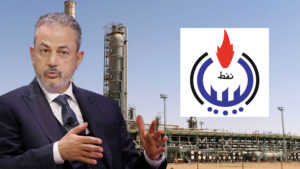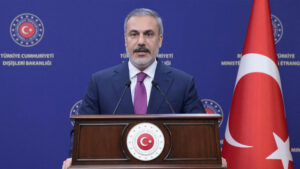It has been blindingly obvious from the start that Russia has set eyes on the strongest asset in Libya; oil, and to that end, Moscow has enlisted the help of the former CIA agent and coup plotter: warlord Khalifa Haftar.
Moscow has never been anything but a true benefit machine and it has always eyed Libyan energy sector. Haftar was just the right guy for Putin. The former wanted military backup to lead a coup on legitimacy and seize power under a totalitarian and military regime, while the latter wanted to earn a new spot of influence and leverage in the Mediterranean, especially that Turkey is on the other side with the Government of National Accord (GNA).
Wagner Group Presence Documented
Russian private military contractor Wagner Group has up to 1,200 people deployed in Libya, strengthening the militias of Khalifa Haftar, according to a confidential United Nations report seen by Reuters on Wednesday.

The 57-page report by independent sanctions monitors, submitted to the UN Security Council Libya sanctions committee, said the Russian contractor deployed forces in specialized military tasks, including sniper teams.
The sanctions monitors said that while they could not independently verify the scale of the deployment to Libya by Wagner Group, “based on open source reporting and the limited sightings assesses that the maximum number of individual private military operatives deployed to be no more than 800 to 1,200.”
“Their deployment has acted as an effective force multiplier for Haftar,” the sanctions monitors wrote.
The monitors also listed the details of 122 Wagner operatives of “whom many are highly probably operational, or have been operational, within Libya.”
They said 39 were from Wagner’s specialist sniper group and the remaining 83 operatives were from Wagner combat units.
The report said forces affiliated with the Government of National Accord had captured arms “typical of the weaponry observed being used by Wagner operatives elsewhere in eastern Ukraine and Syria.”
They are also investigating social media reports that a six-month contract between Wagner and Haftar ended on October 15 last year and accusations that by this time he had only paid half of the more $173 million owed.
Defeat in Tripoli, Relocation to Sirte and Jufra
After months of fighting in western Libya, especially in southern Tripoli, the militias of Haftar had been defeated by GNA forces and pushed out of the region, along with their Russian Wagner Group mercenaries, who were forces to make a quick escape, but failed to keep it off the radar.
The Wagner Group mercenaries had been seen in convoys heading to Bani Walid and after being kicked out of the town from its mayor and residents, they had to flee to Sirte and Jufra to be positioned there as GNA forces laid siege to the cities awaiting the final battle to eliminate Haftar militias’ presence in the region and deny them foothold near oil resources and inside airbases of Jufra and Gardabiya.
Now, Sirte and Jufra harbor the remaining defeated forces of Haftar as well as the Russian and multinational mercenaries fighting for Haftar; not to mention the military equipment pulled out of lost areas in western Libya.
Military Buildup in Oil Crescent Region
Reports have indicated that Russia has been sending reinforcements to Libya to help Haftar, as Moscow seeks to shape the fate of the nation and its vast oil reserves, through private military contractors from Russia aiming to take control of Libya’s largest oil field – Sharara.
Over a week ago, Russian cargo planes have regularly shuttled between a Russian air base in Syria and Libya in recent weeks with what US military officials said could be deliveries of weapons, troops or both to strengthen Haftar as he fights to protect his eastern stronghold and to seize full control of the oil region to use it as a bargaining chip to get back on the political track.
Russia has also dispatched Mig-29 jet fighters and an advanced radar system, according to US reports in last May and June; let alone a series of cash infusions that have helped fund Haftar’s operations.
Reports showed that a delivery to the Haftar-allied central bank in eastern Libya in April involved 100 tons of Russian-manufactured Libyan bank notes, according to Russian customs records reviewed by The Wall Street Journal.
From 2016 to 2018, Russia sent at least $7.11 billion in Libyan currency to the eastern central bank—equivalent to 6.3% of Libya’s annual gross domestic product over that period, according to a UN panel monitoring sanctions on Libya.

The Libyan National Oil Corporation slammed the Russian move at Libya’s oil facilities as, NOC Chairman Sanalla denounced the Russian move into the oilfields, saying: “Libya’s oil is for the Libyan people, and I completely reject attempts by foreign countries to prevent the resumption of oil production. We do not need Russian and other foreign mercenaries in Libya.”
The acting UN special envoy, Stephanie Williams, has also expressed her frustration at the presence of Russian troops in the oilfields.
Mercenaries Paving the Way for Russia’s Grip on Oil
The United States has warned what it described as “Libyan National Army” led by putschist Haftar that its affiliation with Wagner Group and perpetuation of oil shutdowns contradict the interests of both Washington and Libya.

The US State Department said Thursday in a statement that the American delegation emphasized that the Haftar’s affiliation with the Wagner group, a Russian Ministry of Defense proxy, as well as the perpetuation of the oil shutdown are at odds with US and Libyan interests, undermine Libyan sovereignty, and increase the risk of conflict that could damage critical oil infrastructure.
Strategically, if Russia has access in Syria and also in Libya, it gives Moscow a very wide platform because it could be checking the southern flank of NATO, while an increased Russian presence in the country could also see Moscow gain greater control over refugee flows to Europe, which could be used to further destabilize the European Union, according to Foreign Policy.





